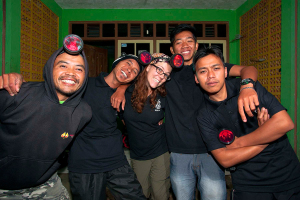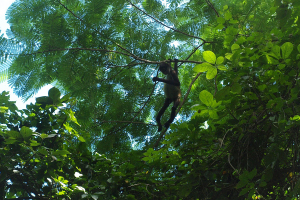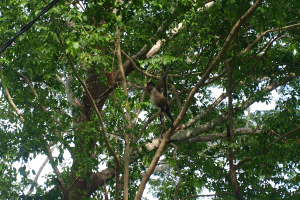
Five months ago I made the big step to travel half way across the world (literally!) to follow a dream. I packed my bags and left the Little Fireface Project, Indonesia and the lorises and went to Mexico to study spider monkeys. Spider monkeys were the first primates I ever had the privilege to study in the wild and when a PhD position in conservation came up I could not let the opportunity pass by. Like slow lorises, all species of spider monkeys are threatened with extinction.
At first I was worried that the difference between the two places would be humungous. But in reality once you get over a monster jetlag, there turned out to be more similarities than differences and it quickly felt like home. Instead of rice with tofu, here we eat tortillas (little corn flour flatbreads) with beans. And instead of hearing the mosque’s call to prayer at 4am, here we hear dogs barking and latin pop music blasting from car speakers. In Mexico, the weather is hot, hot and hotter and the sun shows its face every day.
I am based in the Yucatan Peninsula of Southern Mexico, famous for its beaches (Cancun, Playa del Carmen and Tulum) and burgeoning tourism industry. It is also home to a wonderful conservation organization that I am very happy to be working with called ConMonoMaya(www.facebook.com/ConMonoMaya). Like the Little Fireface Project, ConMonoMaya works hard to raise awareness for conservation issues related to the two primates living in the Peninsula: Geoffroy’s spider monkey and the black howler monkey. It is interesting going from studying primates at night to studying those in the day. I used to have my field backpack filled with three sweaters that I would pull out one by one as the night got colder and a thermos full of sweet, hot coffee. Now my backpack is full of insect repellent and water. Despite the heat, we wear long sleeves in the forest in an attempt to ward off little insects called chiggers. They are leave bites that itch for weeks. Our only defence from these little buggers is a laundry soap called Princessa, but even that does not always work.

 It is especially in conservation issues that I see how similar Java and the Yucatan really are. In Punta Laguna, a long-term spider monkey research site, the monkeys are very well habituated and easy to see. This still means a lot of neck ache as they live so high in the trees! But the monkeys are not shy. When I first arrived, I was very surprised to see the monkeys using trees to cross over the road and very close to electricity cables. My first thought was of Tahini, a loris that in my time in Java sadly passed away as she had dispersed into the village as was electrocuted by power cables. I felt an instant fear for the spider monkeys. They were crossing the road to get to a fruit tree on the other side. Thankfully, infants, mothers and adults all seemed to avoid the electric cables every time.
It is especially in conservation issues that I see how similar Java and the Yucatan really are. In Punta Laguna, a long-term spider monkey research site, the monkeys are very well habituated and easy to see. This still means a lot of neck ache as they live so high in the trees! But the monkeys are not shy. When I first arrived, I was very surprised to see the monkeys using trees to cross over the road and very close to electricity cables. My first thought was of Tahini, a loris that in my time in Java sadly passed away as she had dispersed into the village as was electrocuted by power cables. I felt an instant fear for the spider monkeys. They were crossing the road to get to a fruit tree on the other side. Thankfully, infants, mothers and adults all seemed to avoid the electric cables every time.
Like slow lorises, one of the biggest threats facing spider monkeys in Mexico is the primate pet trade. It is illegal to keep spider monkeys as pets. In Indonesia primates including lorises are traded openly on big illegal wildlife markets, but here infant monkeys are often seen in front of restaurants or along the road. Infants are caught from the wild and at the very least their mother is shot. These little monkeys serve as tourist attractions with no message accompanying the horrors they went through to get there. ConMonoMaya is actively trying to help these monkeys. They give environmental education to schools in the area and are actively working with wildlife services in Mexico. Another similarity is in the children’s faces. I was afraid that I would not see smiles again like those of the children in Cipaganti. The children have the most pure of laughs, so I was very happy when I discovered that those smiles can be found anywhere. The Mayan children of the village light up in exactly the same way when you talk and laugh with them. I feel very lucky to have been part of Little Fireface Project and now ConMonoMaya.
Denise Spaan
